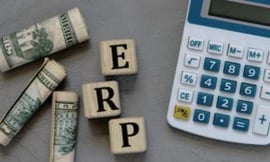4 min read
ERP Implementation – Warning Signs Your ERP Project May be at Risk
Navigating treacherous reefs at night without the guidance of radar or a lighthouse can mean the demise of a ship at sea. Similarly, trying to...
4 min read
KPC_Admin : Updated on October 5, 2023

We have heard this question a lot in recent days. With the trailings of a global pandemic, a war, massively disrupted supply chains, and the resulting economic uncertainties, this is a year where an ERP decision could make or break your business.
At KnowledgPath, we have helped thousands of companies navigate similar waters over the past several decades and can summarize some best practices for managing your technology initiative in 2022 by going back to the business basics found in a game of Monopoly.
Monopoly, a favorite board game of friends and families around the globe, has roots that can be traced back as early as the turn of the twentieth century. While the game itself focuses on property acquisition, the business principles contain a strong footing for any line of business. Specifically, both Monopoly and businesses today face two challenges- continually changing scenarios, and competition. If you have neither of these to deal with and you need a new ERP, then go buy one. If you are navigating impacts from the recent or pending global environment, or you do have competition, read on:
While there are hundreds of variations of Monopoly, whether you’re playing Star Wars, Pokémon, or a variation mapped to your favorite city, the game is essentially the same. You will take your lessons learned from one game to the next.
In a similar mindset, in business, we have plenty of lessons learned from the past to help determine the best course of action in the coming years. Since World War II, the U.S. has experienced twelve recessions, according to the National Bureau of Economic Research (NBER) — an average of one every six years. Recessions and economic downturns are more common than most people realize, and there is a lot to learn from them.
Take a special focus on your business and how the past market fluctuations have been navigated, look at the industry you work in, the effects the pending recession may have on vendors and clients, along with other socioeconomic factors. Mapping similarities to past experiences should help outline a feasible plan and you will not have to “re-create the wheel.”
There are times in a Monopoly game when sitting in jail may be a welcomed result of a roll of the dice, but this is not often. While it may sound safe to suggest sitting back and waiting to see what happens with the economy, we have found the opposite to be true. While you are delaying the financial risk of a technology investment (i.e., landing on your opponent’s property), you are also missing the opportunity to move your business forward. This is known as opportunity cost.
More than likely, your competitors are making moves and if you do not keep up to some extent you may be too far behind when the economy improves. One thing we have learned in the past is that once a recession is finished, economic recovery can be quick. If you have done nothing over the past few years you may simply not be able to catch up.
Following the above point, you may not have the funds to purchase SAP, Oracle, or Pennsylvania Avenue right now, but that does not mean you should do nothing, and you may be able to pick up a less expensive property. Maybe a railroad is in the budget, or you pass “Go” and collect your $200. Options besides implementing Workday or Microsoft Dynamics may include improving core business processes, integrating newer sub-applications with your current ERP, cleansing your data, and targeting the driest areas of need or opportunity.

Perhaps the greatest lesson of Monopoly and business, in general, is to understand your cash position and to establish a forecasting model associating risk and opportunity. It is a game of strategy and adoption. You need to consider not just your bank account, but your property holdings, your opponent’s properties, where you sit on the board, and what it will cost if you either land where you do, or do not want to land.
If implementing a new ERP (Enterprise Resource Planning), HCM (Human Capital Management), or SCM (Supply Chain Management) system will give you an edge in the marketplace, look at your receivables over the coming year, look at changing needs and gaps in the marketplace that you may be able to fill, and look at what this change will bring you in the coming months as well as the coming years when the economy improves. You may realize that you simply must take action now and jump on this opportunity.
When your opponent is short on cash and they have a property you need, now is the time to negotiate. Likewise, if you are finding that you may be able to acquire an ERP in the coming months, consider yourself at an economic advantage. Software vendors are also facing economic challenges and reduced upgrades and new sales, so take this opportunity to negotiate better terms. Better terms may include lower down payments, reduced monthly or annual fees, additional licenses, extra support, or other bonuses vendors can offer.
Likewise, consider that while system integrators may currently be busy, over the coming year resources will begin to open. You may be able to contract for top-tier consulting support that is currently unavailable if you plan to purchase and implement it over the next 12-18 months.
If you don’t know what properties you are after and are just buying up everything you land on, at some point you will run out of money. The same goes for technology. Most businesses have applications that are either under-utilized, outdated or do not integrate well with other technologies. This is a perfect time to audit and update your application and ERP strategy, and if you do not have one, make one now. This will ensure that decisions are not made in haste and that actions taken to navigate the coming economic downturn will align with longer-term business goals.
Perhaps the most important lesson from Monopoly and business is to learn from someone who knows what they are doing. If you are uncertain of what to do in the coming year regarding the use of your technology or need help creating a strategy and a plan forward, contact Knowledge Path - our line is always open.

4 min read
Navigating treacherous reefs at night without the guidance of radar or a lighthouse can mean the demise of a ship at sea. Similarly, trying to...

3 min read
Four things to consider when looking for a new ERP vendor If you’ve decided it’s time to replace your ERP and begun to research new systems,...

In the ever-evolving landscape of business, staying ahead of the curve is imperative for long-term success. One of the crucial decisions facing...